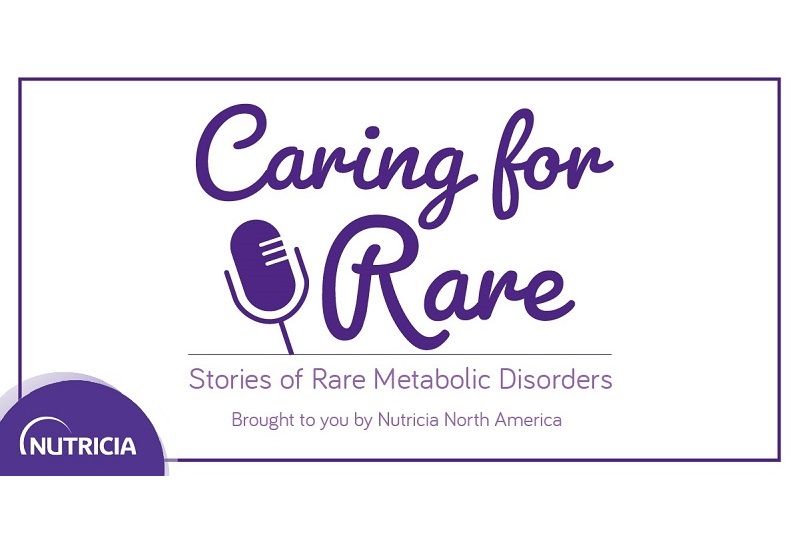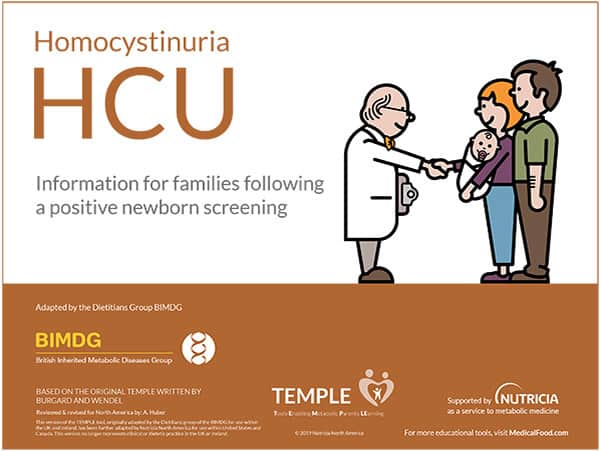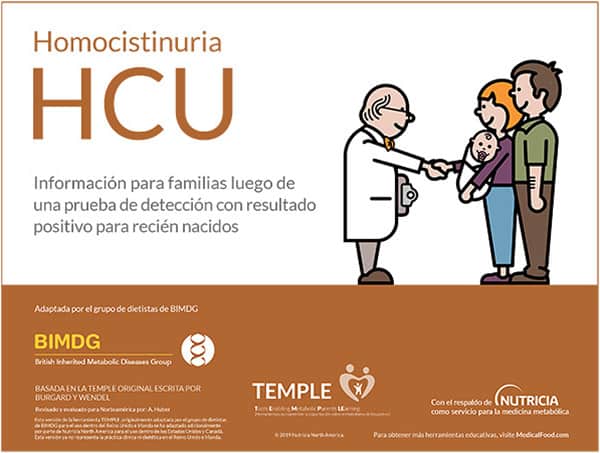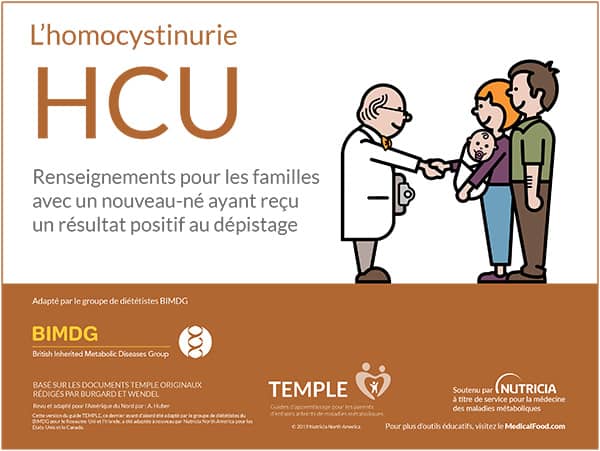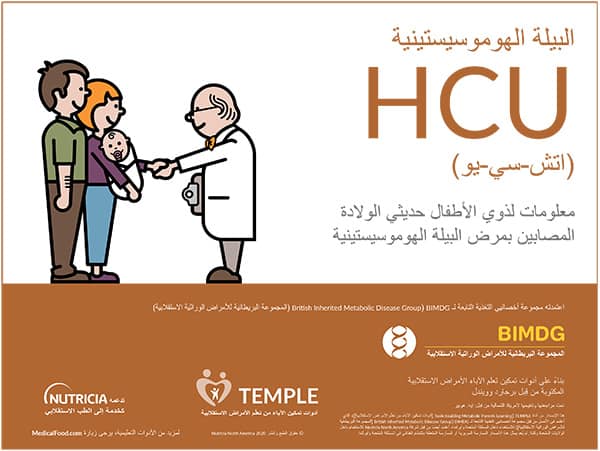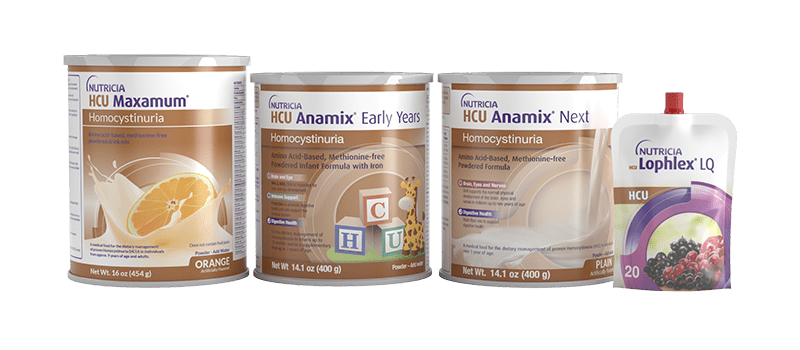HCU - Homocystinuria Education & Support
Homocystinuria (HCU) is an inherited, genetic disorder. “Classic” homocystinuria occurs because of a deficiency of the enzyme cystathionine beta-synthase (CBS). A deficiency in CBS interferes with the body’s ability to fully process an essential amino acid called methionine. If left untreated, this can cause serious health problems. There are two classifications of homocystinuria: pyridoxine-responsive and pyridoxine non-responsive (pyridoxine is another name for vitamin B6).
Methionine is one of 20 amino acids that make up the protein that is found in our bodies and the food we eat. Normally, the body changes extra methionine into homocysteine, which is then changed into other substances, including cysteine (another amino acid). As a result of a CBS deficiency, homocysteine cannot be normally processed, and homocysteine and methionine build up to toxic levels in the body.
Symptoms of untreated homocystinuria relate to the many ways our bodies use homocysteine and methionine. Symptoms can include intellectual disability/developmental delay, epilepsy, dislocation of the lenses of the eye, bone problems (including osteoporosis), blood clotting issues that can lead to a stroke, other vascular (blood) complications and psychiatric problems.
Finding out that your child has HCU can be overwhelming. Fortunately, nutrition management is available to help prevent many of these problems. Take comfort in knowing that your metabolic healthcare team can provide you with the best advice to help manage HCU.
Incidence, Genetics and Newborn Screening
HCU is a rare disorder that occurs in about 1 in every 200,000 births. Much higher rates have been seen in Qatar, Ireland, Germany and Norway.
HCU is inherited as a “recessive disorder.” In recessive disorders, both the mother and father are “carriers,” and they do not have any symptoms of the disorder. With each pregnancy there is a 1 in 4 (25%) chance that the infant will be affected. A genetic counselor can help explain the inheritance of HCU and the risks to future infants.
HCU can be screened for at birth through a simple blood test. For details on newborn screening (NBS) in the US, visit https://newbornscreening.hrsa.gov/your-state; for information on NBS in Canada, visit https://www.raredisorders.ca/.
There is no cure for HCU, but it can be managed with a modified diet, medication, and special medical formulas specifically designed for persons with HCU. The modified diet for HCU is low in methionine. It is important that an individual with HCU continues with management for life. A person with pyridoxine-responsive homocystinuria may not need a medical formula or a modified diet.
A medical formula is a very important part of the diet for HCU. The protein source in HCU medical formulas is individual amino acids, but methionine is left out. This allows a person with HCU to get enough protein without the parts of protein that can be harmful. Medical formulas may also provide calories, vitamins and minerals the body needs for normal growth.
To provide just enough methionine that a person with HCU needs, a limited amount of natural protein-containing foods are allowed in the diet. For infants, breast milk or regular infant formula is given in precise amounts. As the baby grows and can eat solid foods, the breast milk or regular infant formula will be removed from the diet, and the methionine will come from foods instead.
Since all foods with protein contain methionine, individuals with HCU must limit their intake of foods high in protein. These include milk and dairy products, meat, poultry, fish, eggs, beans, nuts and peanut butter. Regular breads and pastas may be allowed in small amounts, but special low protein versions of these foods are often used instead to allow for more choices in the diet and less concern for eating too much protein. Vegetables and fruit are allowed. Foods are usually weighed or measured to ensure that excess protein is not eaten.
Nutricia North America provides a range of medical formulas as well as low protein foods. Please contact us for more information. Your dietitian will help you decide which products are best.
Betaine is a drug designed to help manage HCU. Betaine lowers blood and body levels of homocysteine. This can help prevent some of the medical complications caused by HCU. Folate and vitamin B12 supplements are prescribed for some individuals as well. For individuals with the pyridoxine-responsive form of HCU, therapeutic doses of vitamin B6 are prescribed. Most clinics will do a “pyridoxine challenge” to see how much a person responds to vitamin B6.
Monitoring
An important aspect of management is frequent monitoring to make sure diet, formula prescription and medication dose are appropriate. Monitoring typically includes blood tests; amino acid levels are checked often, and folate and vitamin B12 levels may be checked as well. In addition, follow-up includes monitoring of complications associated with HCU; this may include eye exams, other blood tests, and imaging studies.
During Illness
The risk of thromboembolism (blood clot) is increased with surgical procedures and illness. During any illness, after injury, or prior to surgery, it is very important to notify your metabolic clinic immediately. The diet and/or medications may be adjusted, depending on the type of illness or injury.
| Screening Technologies and Research in Genetics (STAR-G) |
| Newborn Screening in Your State (US) |
| HCU Network America |
| Canadian Organization for Rare Disorders |
Nutricia North America would like to thank Beth Ogata, MS, RD, University of Washington, Seattle for her consultation.
HCU Education
Tools Enabling Metabolic Parents Learning (TEMPLE)
This easy-to-understand education booklet and video are for families affected by a diagnosis of HCU. The book and video share the basics of the disorder and the genetics behind HCU.
Click on the booklet to view and download in your preferred language.
Low Pro Living Support
We have a library of information to help support families like yours throughout the various stages of life's journey. From big moments, like starting college to little ones like what to eat for dinner, we have tips and ideas to help you along the way.


